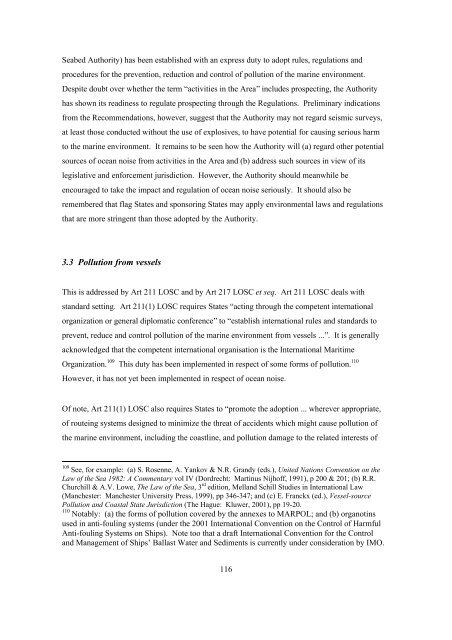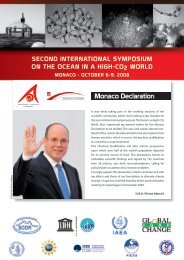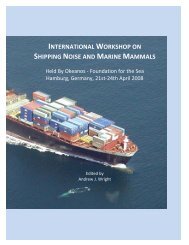Oceans of noise - Whale and Dolphin Conservation Society
Oceans of noise - Whale and Dolphin Conservation Society
Oceans of noise - Whale and Dolphin Conservation Society
- No tags were found...
You also want an ePaper? Increase the reach of your titles
YUMPU automatically turns print PDFs into web optimized ePapers that Google loves.
Seabed Authority) has been established with an express duty to adopt rules, regulations <strong>and</strong>procedures for the prevention, reduction <strong>and</strong> control <strong>of</strong> pollution <strong>of</strong> the marine environment.Despite doubt over whether the term “activities in the Area” includes prospecting, the Authorityhas shown its readiness to regulate prospecting through the Regulations. Preliminary indicationsfrom the Recommendations, however, suggest that the Authority may not regard seismic surveys,at least those conducted without the use <strong>of</strong> explosives, to have potential for causing serious harmto the marine environment. It remains to be seen how the Authority will (a) regard other potentialsources <strong>of</strong> ocean <strong>noise</strong> from activities in the Area <strong>and</strong> (b) address such sources in view <strong>of</strong> itslegislative <strong>and</strong> enforcement jurisdiction. However, the Authority should meanwhile beencouraged to take the impact <strong>and</strong> regulation <strong>of</strong> ocean <strong>noise</strong> seriously. It should also beremembered that flag States <strong>and</strong> sponsoring States may apply environmental laws <strong>and</strong> regulationsthat are more stringent than those adopted by the Authority.3.3 Pollution from vesselsThis is addressed by Art 211 LOSC <strong>and</strong> by Art 217 LOSC et seq. Art 211 LOSC deals withst<strong>and</strong>ard setting. Art 211(1) LOSC requires States “acting through the competent internationalorganization or general diplomatic conference” to “establish international rules <strong>and</strong> st<strong>and</strong>ards toprevent, reduce <strong>and</strong> control pollution <strong>of</strong> the marine environment from vessels ...”. It is generallyacknowledged that the competent international organisation is the International MaritimeOrganization. 109 This duty has been implemented in respect <strong>of</strong> some forms <strong>of</strong> pollution. 110However, it has not yet been implemented in respect <strong>of</strong> ocean <strong>noise</strong>.Of note, Art 211(1) LOSC also requires States to “promote the adoption ... wherever appropriate,<strong>of</strong> routeing systems designed to minimize the threat <strong>of</strong> accidents which might cause pollution <strong>of</strong>the marine environment, including the coastline, <strong>and</strong> pollution damage to the related interests <strong>of</strong>109 See, for example: (a) S. Rosenne, A. Yankov & N.R. Gr<strong>and</strong>y (eds.), United Nations Convention on theLaw <strong>of</strong> the Sea 1982: A Commentary vol IV (Dordrecht: Martinus Nijh<strong>of</strong>f, 1991), p 200 & 201; (b) R.R.Churchill & A.V. Lowe, The Law <strong>of</strong> the Sea, 3 rd edition, Mell<strong>and</strong> Schill Studies in International Law(Manchester: Manchester University Press, 1999), pp 346-347; <strong>and</strong> (c) E. Franckx (ed.), Vessel-sourcePollution <strong>and</strong> Coastal State Jurisdiction (The Hague: Kluwer, 2001), pp 19-20.110 Notably: (a) the forms <strong>of</strong> pollution covered by the annexes to MARPOL; <strong>and</strong> (b) organotinsused in anti-fouling systems (under the 2001 International Convention on the Control <strong>of</strong> HarmfulAnti-fouling Systems on Ships). Note too that a draft International Convention for the Control<strong>and</strong> Management <strong>of</strong> Ships’ Ballast Water <strong>and</strong> Sediments is currently under consideration by IMO.116




